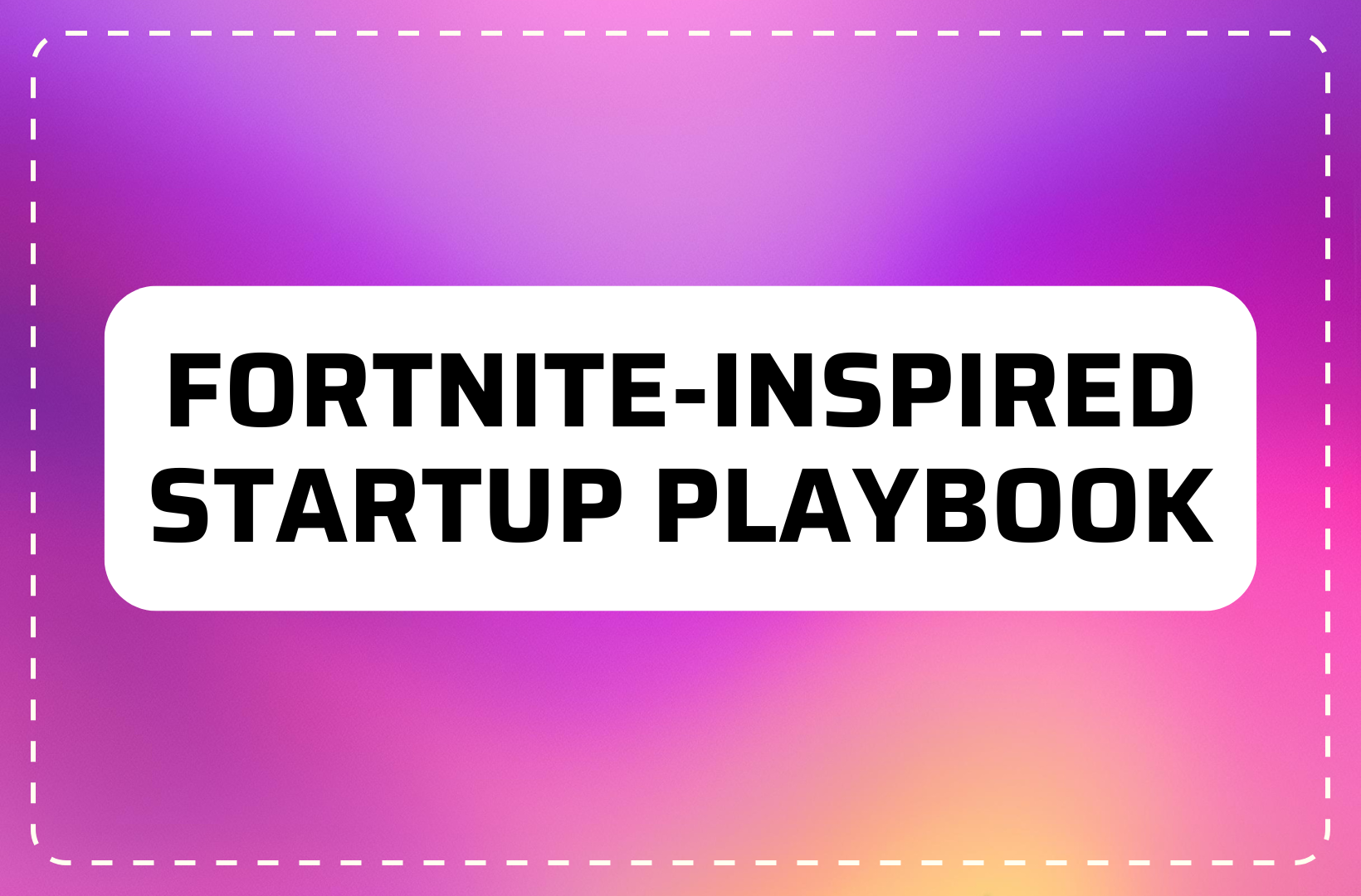Thousands of new video games come out every single year. But very few of them take the gaming world by storm. One of them is Fortnite. As this battle royale title from Epic Games stormed onto the gaming scene, it raked in billions and attracted hundreds of millions of players.
It cemented itself as a pop culture powerhouse, too. Fortnite hosted virtual concerts with famous artists like Travis Scott and Ariana Grande. It also teamed up with brands like Marvel and Nike. Even the silly dances from the game, like the ‘Floss,’ became a global trend, showing up everywhere from schools to social media.

Fortnite's success was not a fluke. Its strategy of putting players first made it a global sensation. If you’re dreaming of building the next breakout title, Fortnite offers some powerful lessons. Here’s what you can learn from its playbook.
Lesson 1: Keep it Free
One of the most impactful decisions Epic Games made was to release Fortnite Battle Royale for free.
This choice, while seemingly counterintuitive from a traditional business standpoint, was a masterstroke. It lowered the barrier to entry and invited a viral explosion of players. This model was a key differentiator from its closest competitor, PUBG, which required an upfront purchase of $30.
The lack of a price tag encouraged millions to download the game. Reports suggest that Fortnite has amassed over 650 million players across the world.
That is not to say that Fortnite doesn’t make money. The game generates its revenue almost entirely through optional, non-essential in-game purchases, known as microtransactions. These purchases are primarily for cosmetic items such as emotes, gliders, and weapon wraps.
Note, though, these items don't offer any competitive advantage, keeping the game balanced and fair for everyone.
If you’re struggling to get people in the door, you could apply this strategy. Removing that initial cost hurdle lowers the barrier to entry. Once people are hooked, they are more likely to spend on extras that enhance their experience rather than simply buying the game itself.
Lesson 2: Constantly Refresh the Experience
Epic Games’ update cadence is relentless. The game is structured into ‘Chapters’ and ‘Seasons,’ with major changes arriving regularly.
Take the "Black Hole Event" back in 2019, which wrapped up Chapter 1. That was a genius way to create a shared, global conversation and build a ton of excitement for the next Chapter. This strategy turns every new game update into a huge, shared event for the community.
So, don’t just launch your game and move on. Listen to your players, update content regularly, and introduce surprises. A world that evolves is a world that keeps people engaged. Something as simple as a new map, a fun weapon, or a quirky event is enough to reignite interest.
Just a heads up: steer clear of design choices that lean into addictive mechanics or exploit player behavior.
Fortnite has faced lawsuits accusing the game of being too addictive, especially for younger audiences. Lawyers estimate video gaming addiction lawsuit payouts could be between $25,000 and $500,000.
Epic Games reached a $2.75 million settlement in Canada over a class-action lawsuit specifically tied to loot boxes in Fortnite, notes TruLaw.
Lesson 3: Don’t be Afraid to Innovate
While Fortnite was not the first battle royale game, it became the most successful by refusing to simply follow the leader. The game's willingness to innovate both in its core gameplay and its business model allowed it to carve out a unique space in a crowded market.
The most significant innovation was the introduction of the building mechanic, a feature carried over from the original Save the World game mode.
This allowed players to construct temporary structures like walls, floors, and ramps in real-time during combat. This single feature created a new skill ceiling and a tactical layer that sets it apart from its competitors, like PUBG.
Epic Games, however, did not stop there. They continued to innovate even after achieving immense popularity.
The introduction of ‘Zero Build’ mode was perhaps the boldest innovation of all. As the game grew, the skill ceiling for building became incredibly high. This intimidated and drove away new players.
In a bold move, Epic Games introduced a permanent no-build mode. This single change instantly made the game accessible to tens of millions of new and returning players.
The success of Fortnite wasn’t an accident or a stroke of luck. It was the result of smart, player-focused decisions. As a startup, you don’t need Fortnite’s budget to apply these lessons. Focus on prioritizing accessibility and adding creative touches, and you can set your game apart in a crowded market.
At the end of the day, gamers stick around for experiences that surprise, delight, and include them. Nail that, and you might just create the next big phenomenon.
FAQ
How did Fortnite’s free-to-play model contribute to its success?
Fortnite’s decision to go free-to-play reduced barriers to entry, drawing millions of players worldwide. By monetizing through optional in-game microtransactions, it ensured the game could remain accessible while still turning a significant profit. Startups can apply this strategy by offering freemium models to attract users and upselling premium features.
Why are constant updates important for a startup product?
Similar to Fortnite’s ever-evolving gameplay with new Chapters and Seasons, regularly updating your product keeps users engaged and excited. Enhancing user experience with new features or addressing community feedback can create loyal advocates for your brand, a key driver of long-term sustainability.
What makes Fortnite’s building mechanic a standout innovation?
The real-time building mechanic introduced a tactical layer to Fortnite, setting it apart from competitors. This innovation demonstrates the importance of differentiating your product with unique features that add value to the user experience. For startups, identifying and amplifying your "wow factor" can be a game-changer.
How can smaller startups innovate on a budget?
Startups may not have the resources of companies like Epic Games, but they can still innovate by leveraging customer feedback to develop high-impact features. Small, strategic changes that solve critical user pain points often make the most significant impression on customers.
What role does accessibility play in a startup’s growth strategy?
Just as Fortnite’s “Zero Build” mode made the game accessible to newcomers, ensuring your product is user-friendly can open the door to a wider audience. Removing barriers like complex onboarding processes or high pricing can drive initial adoption and long-term growth.
Can creative marketing tactics work for startups like they did for Fortnite?
Fortnite’s iconic virtual concerts and pop culture collaborations show the power of a strong brand narrative. Startups can learn from this by forming meaningful partnerships and leveraging content marketing to generate buzz and deepen engagement with their audience.
How does player-first thinking translate to startups?
Fortnite’s success stems from prioritizing player satisfaction in every decision. For startups, this means deeply understanding your user base, solving their core problems, and placing their needs at the center of your product development and business strategies.
What can startups learn from Fortnite’s community-building approach?
Fortnite fosters a vibrant community through shared experiences like game events. Startups can build engaged communities by encouraging user interaction, hosting webinars, or leveraging social media to create shared moments that connect your audience to your brand.
How important is risk-taking for startups?
Fortnite wasn’t Epic Games’ first battle royale, but risk-taking allowed the brand to evolve in bold ways, like introducing “Zero Build” mode. Similarly, startups must experiment and take calculated risks, as innovation often stems from challenging the norm.
Why should startups avoid exploitative practices while growing their audience?
Fortnite has faced lawsuits over claims of creating addictive gameplay, highlighting the risks of prioritizing growth at the expense of ethical practices. Startups should focus on building sustainable engagement models that benefit their users, ensuring long-term trust and success.
About the Author
Violetta Bonenkamp, also known as MeanCEO, is an experienced startup founder with an impressive educational background including an MBA and four other higher education degrees. She has over 20 years of work experience across multiple countries, including 5 years as a solopreneur and serial entrepreneur. Throughout her startup experience she has applied for multiple startup grants at the EU level, in the Netherlands and Malta, and her startups received quite a few of those. She’s been living, studying and working in many countries around the globe and her extensive multicultural experience has influenced her immensely.
About the Publication
Fe/male Switch is an innovative startup platform designed to empower women entrepreneurs through an immersive, game-like experience. Founded in 2020 during the pandemic "without any funding and without any code," this non-profit initiative has evolved into a comprehensive educational tool for aspiring female entrepreneurs.The platform was co-founded by Violetta Shishkina-Bonenkamp, who serves as CEO and one of the lead authors of the Startup News branch. The Fe/male Switch team is located in several countries, including the Netherlands and Malta.


